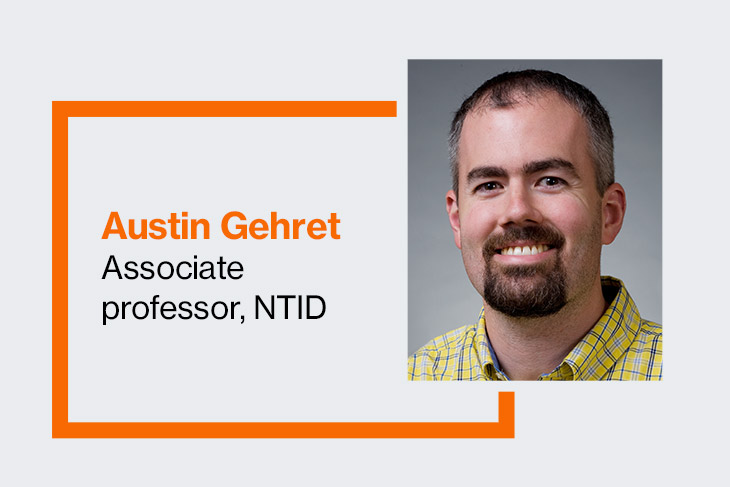RIT/NTID associate professor awarded Ronald D. Dodge Memorial Faculty Grant
Austin Gehret honored for his work researching e-learning models for deaf, hard-of-hearing students
Austin Gehret, an associate professor in the Department of Science and Mathematics at Rochester Institute of Technology’s National Technical Institute for the Deaf, has been awarded the 2020-2021 Ronald D. Dodge Memorial Faculty Grant for his research project exploring the development of an e-learning model for deaf and hard-of-hearing students. Gehret’s research is especially vital during the COVID-19 pandemic as remote learning for all students has become the “new normal.”
According to Gehret’s proposal, the project investigates features of the Cognitive Theory of Multimedia Learning and how it is likely applicable to the e-learning of deaf and hard-of-hearing students. The Cognitive Theory of Multimedia Learning assumes that there are auditory and visual channels for processing information, that there is limited channel capacity, and that learning is an active process of filtering, selecting, organizing, and integrating information. The project also aims to help establish design guidelines for deaf and hard-of-hearing audiences that effectively elicit gains in learning.
“The project couldn’t have come at a better time, given the heightened emphasis placed on enhancing online or e-learning at RIT and the need for remote learning during the current COVID-19 pandemic,” said Gerry Buckley, NTID president and RIT vice president and dean. “This new learning environment necessarily requires an approach by faculty that incorporates best practices for content delivery. I applaud Dr. Gehret for his work and know it will bring about important results for our students and faculty.”
According to Gehret, multimedia that is developed for e-learning needs to support the active processing of the learner in order for them to develop meaningful learning. RIT/NTID faculty have a unique challenge in this regard as their target population has traditionally been underserved and under-researched with respect to models of e-learning. Gehret says that this is additionally problematic because demand is outpacing supply significantly.
A recent report on deaf and hard-of-hearing undergraduate enrollment indicated that while these students comprise only 1.3 percent of the total undergraduate population, their adoption of online courses (45.7 percent) and fully online programs (17.1 percent) exceeds that of their hearing peers, at 42.9 percent and 10.7 percent, respectively.
“As both the availability of online learning resources and the emphasis on enhancing RIT’s online portfolio continue to grow, we have a responsibility as NTID faculty to ensure the online materials we develop for our deaf and hard-of-hearing students meaningfully impacts their learning,” Gehret said. “It is our intent that this project will seed a new understanding of the critical features, beyond just those addressing accessibility, needed for online materials to positively impact deaf and hard-of-hearing students’ learning.”
Additional project personnel are Lisa Elliot, research faculty, NTID Office of the Associate Dean for Research; and Linda Bryant, director, NTID Learning Consortium and Online Learning Initiatives.
The grant is offered annually to faculty members for financial assistance in supporting research and development efforts conducted during the academic year. Projects must have as their purpose improving the effectiveness of faculty engaged in educating deaf and hard-of-hearing students at RIT. Applicants must be faculty who have completed at least three academic years of employment at RIT prior to being considered for a grant. Potential grant recipients are expected to file appropriate documentation to establish the potential impact of the work upon teaching effectiveness for deaf students at RIT.





